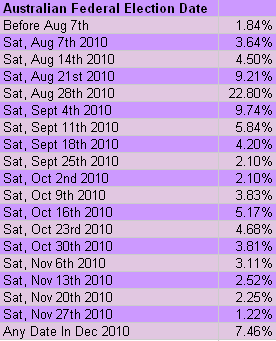Good sense prevails. There was only one thing that would have been stupider than Kevin Rudd wanting to immediately get a job in the first Julia Gillard ministry and that would have been her giving him one. The absolute minimum of reshuffling was what was needed and what the new Prime Minister sensibly delivered. There is no doubt that there will be a minimum of delay before an election is called. Opposition Treasury spokesman Joe Hockey might even have got it right this morning when he predicted the election would be called this weekend.
A little form guide. As a little guide here is the Crikey Election Date Indicator with probabilities for each date based on what the markets are currently indicating:

The favoured date of 28 August is a little later than what would be chosen if the Hockey prediction about the election being called this weekend comes true.
Paul Krugman on “The Third Depression”. It was reading the latest op-ed piece in The New York Times by the Nobel prize winning economist Paul Krugman, The Third Depression, that has sent me back to delving into the kind of economic texts I have hardly glanced at for 50 years. I had, quite unthinkingly really, mentally discarded all that Keynesian stuff that still was taught when I went to university and accepted the new orthodoxies of fighting inflation first and foremost, pandering to the markets and balancing government budgets. Then this Professor Krugman bloke, who someone or other somewhere had thought worthy of a major gong and who wrote with an understandable simplicity about the most complex of subjects, came on my internet reading radar and I was right back to Economic History I with Lord Keynes at my side.
My complacent acceptance that stern and punishing economic matters were good for us in the long run has taken a more worrying turn as I read comments like this on the Krugman blog last week:
We’ve suffered the worst cyclical downturn since the Great Depression; in terms of unemployment and output gaps, we have recovered almost none of the lost ground. Millions of willing workers are idle because of lack of demand; let them stay idle, and we can turn this into a long-term structural problem, but right now it is precisely a short-term, cyclical problem.
So saying that we need to focus on the long term, and not worry our little heads about trivial short-term issues like the highest long-term unemployment rate since the Great Depression, may sound like wisdom — but it’s actually folly.
Oh, and one more point … about quite a few policymakers and economists: the attempt to shift the discussion away from the short run is not, as often portrayed, an act of vision of courage. On the contrary, it’s an act of cowardice, an attempt to evade responsibility for a disastrous state of affairs that we could fix, but choose not to. Keynes had it right: But this long run is a misleading guide to current affairs. In the long run we are all dead. Economists set themselves too easy, too useless a task if in tempestuous seasons they can only tell us that when the storm is long past the ocean is flat again.
That is a depressingly thought provoking commentary when you read it after looking at the communique from the world leaders at the G20 Conference just concluded in Canada. There was very little concern for the rising number of unemployed in Europe and the continuing 10% level in the United States in those formal words. Which is what provoked yesterday’s melancholy Prof. Krugman judgement:
“We are now, I fear, in the early stages of a third depression. It will probably look more like the Long Depression [the panic of 1873 with the years of deflation and instability that followed it] than the much more severe Great Depression [of 1929-31and the years of mass unemployment that followed them]. But the cost — to the world economy and, above all, to the millions of lives blighted by the absence of jobs — will nonetheless be immense.And this third depression will be primarily a failure of policy. Around the world — most recently at last weekend’s deeply discouraging G-20 meeting — governments are obsessing about inflation when the real threat is deflation, preaching the need for belt-tightening when the real problem is inadequate spending.”
So off I am scampering to swat up on this deflation business while all the time hoping that my concerns are simply the result of being influenced by a good writer rather than a man who is actually right. A long period of a proper Depression is just too depressing to contemplate.
Something for frequent flyers. Just a little news for frequent flyers to contemplate from USA Today overnight:

Enjoy your dinner.







Dr Harvey M Tarvydas
‘A little form guide.’
Richard, You are so right about so much you say here. You put it rather well but I am saving myself from worrying as profoundly as you for the moment since I believe that many of the leader statements made at the G20 that worry me just as you say are political speeches of necessity because any competent Government in today’s politics will have the inevitable carping “big spending, Nation destructing” noise that our Government has to put up with from an opportunistic opposition even if they know better.
Here’s to Paul Krugman, may he live longer than he’s supposed to and beat the riff raff.